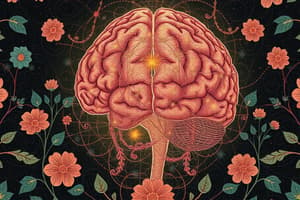Podcast
Questions and Answers
What is the primary focus of neuropsychology?
What is the primary focus of neuropsychology?
- Conducting assessments on emotional regulation disorders
- Studying the relationship between cognitive processes and specific regions of the brain (correct)
- Investigating the effects of social interactions on memory
- Exploring the impact of nutrition on brain functions
Which of the following is NOT typically assessed in a neuropsychological evaluation?
Which of the following is NOT typically assessed in a neuropsychological evaluation?
- Problem-solving skills
- Language abilities
- Memory
- Muscle coordination (correct)
What is the primary focus of neuropsychological evaluations in patients with schizophrenia?
What is the primary focus of neuropsychological evaluations in patients with schizophrenia?
- Assessing motor skills and coordination
- Exploring alterations in emotional regulation and decision-making abilities
- Identifying cognitive deficits related to memory, attention, and executive function (correct)
- Developing interventions for cognitive functions after brain injury
What brain structure is mentioned as being involved in the processing of emotions like fear and happiness?
What brain structure is mentioned as being involved in the processing of emotions like fear and happiness?
Which of the following cognitive functions might be assessed through tasks that measure the ability to find solutions to problems?
Which of the following cognitive functions might be assessed through tasks that measure the ability to find solutions to problems?
In neuropsychology, what do therapists focus on during rehabilitation after brain injury or disease?
In neuropsychology, what do therapists focus on during rehabilitation after brain injury or disease?
What interdisciplinary approach does neuropsychology involve to understand brain functions?
What interdisciplinary approach does neuropsychology involve to understand brain functions?
Which of the following is NOT a technique used in neuropsychological rehabilitation?
Which of the following is NOT a technique used in neuropsychological rehabilitation?
What aspect of human behavior do neuropsychologists seek to understand through the study of brain structure and function?
What aspect of human behavior do neuropsychologists seek to understand through the study of brain structure and function?
How does neuropsychology contribute to the care of individuals with neurological issues?
How does neuropsychology contribute to the care of individuals with neurological issues?
Study Notes
Neuropsychology is the branch of psychology that studies the relationship between cognitive processes or behavior and specific regions of the brain. It involves the assessment of various functions such as memory, learning, problem solving, attention, perception, language, and emotion regulation. This field combines knowledge from psychology, medicine, and biology to understand how the nervous system contributes to these functions.
In a typical neuropsychological assessment, tests are used to evaluate different aspects of cognition and behavior. For example, memory may be assessed using tasks that measure recall and recognition of information. Learning might be evaluated through tasks that measure the ability to learn new information or procedures. Problem-solving skills can be assessed by tasks that require individuals to find solutions to problems.
Additionally, neuropsychologists may examine the role of emotion in cognitive functions. They study brain structures like the amygdala, which plays a role in processing emotions like fear and happiness. Emotional regulation disorders, such as irritability and lability, have been linked to dysfunctions in the amygdala and prefrontal cortex (PFC).
When it comes to specific conditions, neuropsychology has made significant contributions to understanding various neurological and psychiatric disorders. For instance, in schizophrenia, researchers conduct neuropsychological evaluations to identify cognitive deficits related to memory, attention, and executive function. In patients with mood disorders, such as depression and anxiety, neuropsychologists explore alterations in emotional regulation and decision-making abilities.
The field also encompasses neuropsychological rehabilitation, where therapists develop interventions aimed at improving cognitive functions after brain injury or disease. Techniques may include cognitive training exercises, computer assisted therapy, and educational programs designed to facilitate recovery.
Overall, neuropsychology provides valuable insights into the complex interactions between brain structure and function, contributing to our understanding of human behavior and its disorders. By employing a variety of assessment methods and intervention strategies, this field continues to advance our knowledge and improve care for those affected by neurological issues.
Studying That Suits You
Use AI to generate personalized quizzes and flashcards to suit your learning preferences.
Description
Test your knowledge on the relationship between cognitive processes, behavior, and brain regions with this quiz on neuropsychology. Explore topics such as memory, learning, problem-solving, emotion regulation, and neuropsychological assessments.



